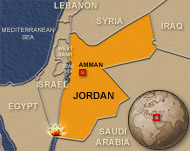Jordan investigates oil-for-food deals
Jordan has announced that it is investigating companies and individuals that may have broken the law by making payments that ended up in the coffers of Saddam Hussein’s government under the corruption-riddled UN oil-for-food programme.

According to a UN report released last week by an independent commission, Jordanian businessman Fawaz Zureikat was accorded lucrative Iraqi oil allocations to support a campaign for lifting UN sanctions imposed on Iraq after its 1990 invasion of Kuwait.
Deputy Prime Minister Marwan Muasher said on Monday that a state committee was formed to “study all parts of the UN report, specifically parts pertaining to Jordan“.
Muasher declined further comment, saying the government was awaiting the findings of its committee.
The independent UN commission, led by former US Federal Reserve chairman Paul Volcker, cited illicit activities by individuals in Jordan other than Zureikat and even the Ministry of Mineral Resources – which has strongly denied illegal transactions, saying it only imported Iraqi crude under a deal given the tacit approval of the UN.
Key allies
Jordan and Turkey, key allies of the US, were major recipients of Iraqi oil. The report said that the US showed “tolerance” for Iraqi trade with both Middle East nations.
Jordan has long argued that it had approached the UN for approval for its oil imports from Iraq provided to the cash-strapped kingdom at preferential prices.
 |
|
Jordan says it paid Iraq for oil |
No cash was involved in the deal and Jordan has said that it paid Iraq back through exports of food and humanitarian supplies exempt from the UN embargo.
Instead of approval, the UN Security Council “took note” of Jordan‘s intent to import Iraqi crude, but “made no genuine effort … to monitor these transactions or the goods that Jordan in turn shipped back to Iraq“, the UN report said.
This “furnished sufficient cover for Jordan to acquire nearly $6 billion (€ 4.8 billion) of oil from Iraq,” or well over half of all Saddam’s illicit revenues during the oil-for-food programme, according to the Volcker Committee.
It said more than 2200 companies and individuals paid kickbacks and illegal surcharges to win contracts while Saddam pocketed $1.8 billion (€1.5 billion) at the expense of ordinary Iraqis suffering under UN sanctions.
It stressed that Saddam was able to keep filling his coffers primarily because of shoddy UN management and failures by the world’s most powerful nations, which allowed the racket to go on for years.
Galloway denial
Saddam’s government had given lucrative allocations for 18 million barrels of oil to British lawmaker George Galloway, directly and through his business associate, Zureikat, to support his campaign for lifting the sanctions.
Zureikat made large donations to Galloway‘s charity, the Mariam Appeal, which the lawmaker set up in 1998 to help a four-year-old Iraqi girl with leukaemia and to fight the sanctions.
 |
|
Galloway denies any knowledge |
The report quoted Iraqi officials as saying the oil allocations were meant to fund Galloway‘s anti-sanctions activities.
Galloway has vehemently denied that he ever had any knowledge of oil being allocated in his name or asked anyone to seek allocations for him.
He told Aljazeera.net that his work was political, not charity, and received financial support from well-known sources.
“Our goal was to lift the sanction on Iraq which killed more than one million people. We were not charity, our work was political,” he told Aljazeera.net.
“Three men funded our work – the late Shaikh Zayed bin Sultan [Al-Nahyan], president of the United Arab Emirates; the then Crown Prince and current King of Saudi Arabia, Abdullah bin Abdal-Aziz, and the Jordanian bussinessman Fawaz Zureikat.
No benefit
“I did not ask them the source of their money. They are very well-known people, and I was grateful for their generosity to achieve our aim and save the lives of many Iraqis,” Galloway said.
|
“Our goal was to lift the sanction on Iraq which killed more than one million people” George Galloway, |
He emphasised that he not benefit from his work to lift the sanction on Iraq, and he has been and will be proud of what he has been doing to save people’s lives.
Zureikat told The Associated Press on Monday that he and Galloway “did not break any Jordanian laws”.
“We acted under the laws and the state completely monitored all our trade activities,” he said.
Zureikat said he was not approached by the Jordanian committee, but that he was questioned by the US Congress and UN officials during the drafting of the Volcker report. He declined to elaborate.